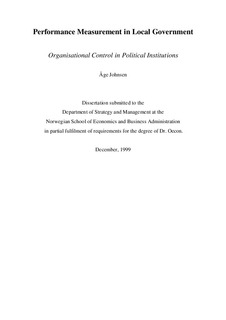Performance measurement in local government: organisational control in political institutions
Doctoral thesis
Permanent lenke
http://hdl.handle.net/11250/164360Utgivelsesdato
2010-11-23Metadata
Vis full innførselSamlinger
Sammendrag
This thesis deals with how asymmetric information and uncertainty affect performance measurement in local government organisational control. Performance measurement was found to be extensively studied in the classics of organisation theory, especially in conjunction with organisational learning. However, conventional wisdom predicts that
with uncertain and ambiguous contingencies, organisations will use budget control, clan
control or political control. Other use of formal control structures will largely be
symbolic and decoupled from internal actions. Public choice, agency theory and the resource dependence perspective have in this thesis been suggested as a core of a
performance measurement research programme. Experiences with performance measurement actually used in the public sector in the 1980s and 1990s, as documented in 24 studies reported in scholarly journals, were systematically reviewed, and 10
hypotheses were formulated. Prior performance measurement indexes reported in the literature were in the present study modified to also incorporate verbal conclusions in addition to numerical performance indicators. Data from 162 Norwegian municipal annual reports was then collected by content analysis and analysed with difference between means in crosstabulations, multiple regression, and by a simple case study. Contrary to conventional wisdom, performance measurement was found to be extensively used and particularly under asymmetric information and uncertainty. Implications of the findings point to the need to utilise agency theory, classical contingency theory and the resource dependence perspective more in public management theory.
